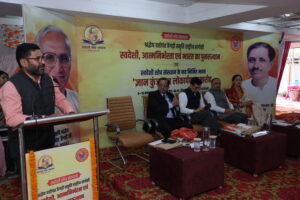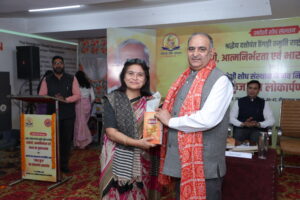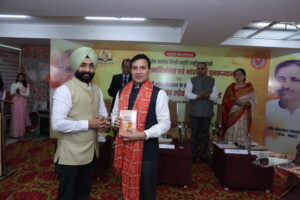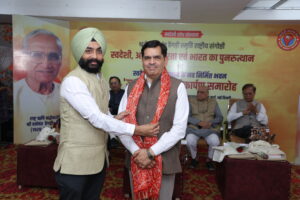Shradheya Dattopant Thengdi Commemorative National Seminar
Session 3 Report
Theme: Strengthening Economy for Self-Reliant Bharat
Date: Nov 9, 2025
Time: 02:30 pm
Venue: Gyan Kunj, New Delhi
Speakers: Prof. Ram Singh, Prof. B.R. Kamboj, Sh. Ajay Srivastava, Prof. Ashwini Mahajan, Industry Experts, and Guest Speakers including Prof. Anupama and Prof. Suresh
Incharge: Dr. Sidharth, Dr. Suresh
 The third session of the Shradheya Dattopant Thengdi Commemorative National Seminar brought together distinguished academicians, economists, and industry leaders to deliberate on the theme Strengthening Economy for Self-Reliant Bharat. The session emphasized strategic pathways for achieving economic resilience through indigenous production, cooperative development, women’s participation, and sound tariff planning—aligning with Thengdi ji’s Swadeshi philosophy.
The third session of the Shradheya Dattopant Thengdi Commemorative National Seminar brought together distinguished academicians, economists, and industry leaders to deliberate on the theme Strengthening Economy for Self-Reliant Bharat. The session emphasized strategic pathways for achieving economic resilience through indigenous production, cooperative development, women’s participation, and sound tariff planning—aligning with Thengdi ji’s Swadeshi philosophy.
The session was efficiently anchored by Prof. Suresh, Co-convenor of the Delhi Chapter of the Swadeshi Shodh Sansthan, noted for her expertise in India-Africa relations. She opened the session by welcoming eminent dignitaries, including Prof. B.R. Kamboj (Vice Chancellor, Chaudhary Charan Singh University, Haryana), Prof. Anupama (Vice Chancellor, Sardar Patel University), Prof. Ram Singh (Delhi School of Economics), Prof. Ashwini Mahajan (National Co-convenor, Swadeshi Jagaran Manch), and economic expert Sh. Ajay Srivastava.
As part of the opening moments, a felicitation ceremony honored leading participants: Dr. Sarabjeet felicitated Prof. Ram Singh; Prof. Nandini felicitated Prof. Anupama; Prof. Pradeep felicitated Prof. Vineet; and Prof. Ritu felicitated Prof. B.R. Kamboj. The theme was aptly encapsulated in the message—“We are standing on our own feet,” symbolizing the vision of Atmanirbhar Bharat.
Prof. Anupama: Women Empowerment and Economic Swarajya
 The first address was delivered by Prof. Anupama, who focused on Women Empowerment and Inclusive Growth. She highlighted that with women comprising 50 percent of India’s population, their empowerment is not only a matter of equality but also a necessity for holistic national progress. Drawing from her research in Himachal Pradesh, she noted that nearly 70 percent of agricultural work is done by women, yet their contributions often go unrecognized due to patriarchal ownership patterns and unequal access to resources.
The first address was delivered by Prof. Anupama, who focused on Women Empowerment and Inclusive Growth. She highlighted that with women comprising 50 percent of India’s population, their empowerment is not only a matter of equality but also a necessity for holistic national progress. Drawing from her research in Himachal Pradesh, she noted that nearly 70 percent of agricultural work is done by women, yet their contributions often go unrecognized due to patriarchal ownership patterns and unequal access to resources.
Prof. Anupama pointed out that most women engaged in agriculture are confined to low-income tasks while men handle mechanized and commercial roles such as ploughing and marketing produce. Decreasing landholdings have further reduced family incomes, increasing rural distress.
She discussed the evolution of Self-Help Groups (SHGs) over the past two decades, appreciating Andhra Pradesh as a model of empowerment. In Himachal Pradesh alone, nearly 50,000 SHGs engage around 8 to 10 lakh women. However, she expressed concern that 99 percent of SHGs lack training in value addition and modern skills, constraining their growth. Limited access to credit and technology further restricts income enhancement. Platforms like HIM ERA, initiated by the Himachal Government, have been positive steps in offering women an e-marketplace, yet capacity-building remains minimal.
She underlined that true empowerment will arise from Swarajya through Rozgaar, economic self-dependence based on knowledge, education, and ownership of assets. Her address concluded by reaffirming that women’s empowerment must be framed as a participatory process that transforms not only households but also the nation’s development model.
Sh. Ajay Srivastava: India’s Tariff Strategy and Economic Valuation
 Next, Sh. Ajay Srivastava presented a meticulous analysis on India’s tariff and valuation strategy in the global economy. Drawing from his association with the Swadeshi Shodh Sansthan since 2018 under the guidance of Sh. R. Sundaram, he provided a lucid understanding of how valuation plays a pivotal role in national economic planning.
Next, Sh. Ajay Srivastava presented a meticulous analysis on India’s tariff and valuation strategy in the global economy. Drawing from his association with the Swadeshi Shodh Sansthan since 2018 under the guidance of Sh. R. Sundaram, he provided a lucid understanding of how valuation plays a pivotal role in national economic planning.
He outlined that economics, in its essence, is an umbrella discipline that interprets how assets evolve and sustain. Valuation, he argued, is not just historical accounting but a forward-looking economic instrument that can convert potential assets into real capital. He introduced the Three Pillars of Reliance—Production, Participation, and Protection.
- Production involves stimulating domestic manufacturing through the Make in India initiative and Start-up missions.
- Participation emphasizes the contribution of MSMEs and local entrepreneurs to employment and innovation.
- Protection underlines a robust financial system that maintains stability and ensures economic resilience.
He noted that over 50 percent of corporate valuation today lies in intangible assets such as intellectual property, brand equity, and innovation capacity. India’s strategic focus, therefore, must extend beyond tangible production toward strengthening knowledge-based industries. His discussion on mergers and acquisitions highlighted how valuation can serve as a national strength by linking financial transparency with industrial competitiveness.
Dr. B.R. Kamboj: Cooperatives and Rural Industries for Balanced Development
 Prof. B.R. Kamboj, recipient of the M.S. Swaminathan Award and a leading agricultural scientist, reflected on the role of cooperatives in achieving balanced growth. As Vice Chancellor of Chaudhary Charan Singh University and Agriculture Head at the Swadeshi Shodh Sansthan, he emphasized that the cooperative model remains India’s most time-tested vehicle for ensuring equity in agriculture and rural industry.
Prof. B.R. Kamboj, recipient of the M.S. Swaminathan Award and a leading agricultural scientist, reflected on the role of cooperatives in achieving balanced growth. As Vice Chancellor of Chaudhary Charan Singh University and Agriculture Head at the Swadeshi Shodh Sansthan, he emphasized that the cooperative model remains India’s most time-tested vehicle for ensuring equity in agriculture and rural industry.
He shared insights from his visits to villages in Maharashtra, where rural women utilize local clay to produce traditional lamps—combining entrepreneurship with cultural preservation. He suggested that India must strengthen micro-cooperatives and link them with technology transfer institutions to guarantee both sustainability and profitability.
He also reminded that modernization in agriculture does not necessarily mean mechanization alone; it includes systemic innovation, resource optimization, and educational intervention. He proposed a collaborative model comprising Groups, Cooperatives, and Educational Institutions to design curricula that train rural youth for managing modern cooperatives.
Prof. Ram Singh: Future Directions for Economic Self-Reliance
 Prof. Ram Singh from the Delhi School of Economics focused on India’s macroeconomic transformation and its global positioning. He began by tracing the historical evolution of India’s economic agenda, from the Swadeshi movement to modern Atmanirbharta policies, and argued that a self-reliant economy requires a balance between international trade and domestic capacity-building.
Prof. Ram Singh from the Delhi School of Economics focused on India’s macroeconomic transformation and its global positioning. He began by tracing the historical evolution of India’s economic agenda, from the Swadeshi movement to modern Atmanirbharta policies, and argued that a self-reliant economy requires a balance between international trade and domestic capacity-building.
He posited that three pillars—Exports, Research, and Education—form the backbone of any sustainable self-reliant framework. Drawing from the growth experience of nations like Japan and South Korea, Prof. Singh asserted that education and skilling are central to productivity enhancement. His statement that “Developed India is not a dream but a disciplined journey” resonated with the audience.
He emphasized diversifying exports, investing in tourism to generate employment, and channeling Foreign Direct Investment (FDI) toward technology transfer rather than consumption-based ventures. With India holding one of the world’s youngest populations, he urged greater focus on vocational skill development to make this demographic dividend a driver of prosperity by 2047.
Industry Expert: Role of MSMEs in Self-Reliant India
The industry perspective complemented the theoretical insights of academic speakers. The expert underlined the pivotal role of MSMEs as economic shock absorbers that contribute 30 percent to India’s GDP and employ more than 11 crore people. Yet, the sector continues to face structural challenges like restricted financing, lack of digitalization, and non-uniform product standards.
He suggested adopting a cluster-based model to unify small producers, promote research-led innovation, and enhance access to technology. Strengthening linkages between MSMEs, universities, and research institutes was proposed as a necessary step toward global competitiveness. He reiterated that “Swadeshi entrepreneurship is not anti-globalization—it is responsible globalization that starts at home.”
Prof. Ashwini Mahajan: Presidential Address
 The session concluded with an insightful presidential address by Prof. Ashwini Mahajan, who synthesized the deliberations into a unified vision of Economic Nationalism grounded in Dharma. He explained that self-reliance is not autarky, but the conscious choice to prioritize indigenous capabilities and ethical economic practices.
The session concluded with an insightful presidential address by Prof. Ashwini Mahajan, who synthesized the deliberations into a unified vision of Economic Nationalism grounded in Dharma. He explained that self-reliance is not autarky, but the conscious choice to prioritize indigenous capabilities and ethical economic practices.
He endorsed the collective ideas presented during the session—boosting MSMEs, empowering women, modernizing cooperatives, and reforming academia to develop future-ready skills. Prof. Mahajan emphasized that economic policies must reflect civilizational values and sustainability, ensuring that India’s progress benefits the last person in the line.
Conclusion
Session 3 offered a multidimensional roadmap for economic revitalization rooted in India’s civilizational consciousness. From Prof. Ram Singh’s structural analysis to Prof. Anupama’s gender perspective, from Prof. Kamboj’s cooperative model to Ajay Srivastava’s economic valuation insights, and Prof. Mahajan’s philosophical synthesis, the discussions converged on a unified message—Self-Reliant Bharat is both an economic mission and a moral commitment.
Anchored gracefully by Dr. Suresh, with guidance from Dr. Sidharth, the session advanced the broader seminar’s vision of building a resilient economy powered by indigenous innovation, inclusive participation, and ethical governance. As envisioned by Shradheya Dattopant Thengdi ji, the path to Bharat’s prosperity lies not merely in wealth creation but in harmonizing economic strength with spiritual and cultural self-awareness.






